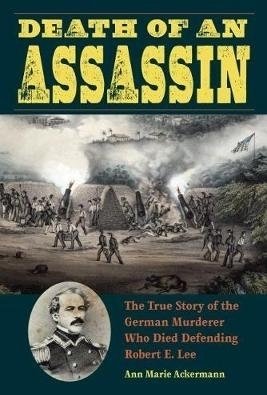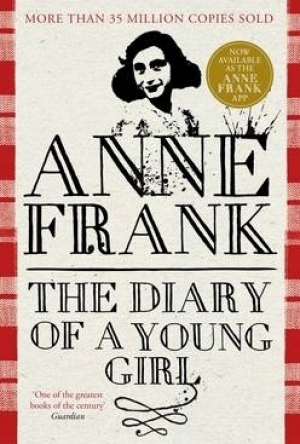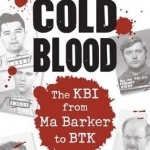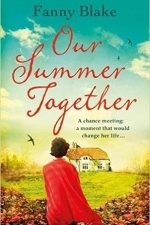
Death of an Assassin: The True Story of the German Murderer Who Died Defending Robert E. Lee
Book
From the depths of German and American archives comes a story one soldier never wanted told. The...

Breaking Glass Barefoot
Book
Hazel O'Connor has loved and been loved, but her generosity and spirit of adventure have often come...

The Diary of a Young Girl
Anne Frank, Mirjam Pressler and Otto Frank
Book
One of the most famous accounts of living under the Nazi regime of World War II comes from the diary...

Beyond Cold Blood: The KBI from Ma Barker to BTK
Book
Ma Barker and Pretty Boy Floyd once shot their way across the state, and Bonnie and Clyde were known...
The Bandersnatch (199 KP) rated Memoirs of a Geisha in Books
Nov 7, 2019
My opinion of the book is one of both curiosity and interest. Japan is one of those countries where its history and culture is both unusual and mysterious. The book gives a brief glimpse into the hidden world of the Geisha which are a prominent spot in Japanese culture but are relatively unknown world wide. I believe that the story of Sayuri is one of personal travel and evolution. Since we see Sayuri';s experience as a child before becoming a Geisha, experiencing the horror of war and eventually finding love with the Chairman.
Arthur Golden was born on December 6th 1956 in Chattanooga, Tennessee. When he was eight years old his parents divorced with his father dying five years later. He spent most of his childhood living in lookout mountain, Georgia before graduating from the Baylor school in Chattanooga in 1974. After earning a degree in Fine art (Specifically Japanese art), an M. A. in Japanese history, Golden spent a summer at the Peking University in Beijing and spent some time working in Tokyo. When he returned to the states he earned an M. A. in English at Boston University. Golden married Trudi Legge and they went on to have two children Hays and Tess.
After getting the initial idea for Memoirs of a Geisha Golden spent six years over the story rewriting it at least three times, changing the view point until settling on the viewpoint of Sayuri. Golden had spent time interviewing several Geisha including Mineko Iwasaki (who ended up suing Golden when the Japanese version of the book came out for breach of contract.....the case was settled out of court in 2003) all of whom provided information about the world of the Geisha. After its release Memoirs of a Geisha spent two years on the New York Times bestseller list, its sold more than four million copies in English alone and has been translated into thirty-two languages around the world. In 2005 the book was made into a movie garnering three academy awards.
My opinion of Arthur Golden is very small and somewhat limited.......I believe he is a fantastic writer and very knowledgeable about Japanese history and art....Much more so than I am but hearing he faced being sued because of citing who his sources were when he was contracted not to has put something of a dampener on his character in my eyes.
Memoirs of a Geisha was released as a Movie on December 9th 2005 under director Rob Marshall and Produced by Steven Spielberg's production Company Amblin Entertainment and Spyglass Entertainment. With its production from pre- to post-production taking place mainly in California US, with a few spots filmed in Kyoto Japan. The movie received mixed reviews in the western world and received somewhat negative reviews in Japan due to its mixed casting of Chinese and Japanese actors and actresses and its relationship to history. Despite the chaos they won three Academy Awards (Best Art Direction, Best Cinematography and Best Costume Design), a Golden Globe (Best Original Score), A national Board of review (Best Supporting Actress), a satellite award (Outstanding screenplay) and three BAFTA's (Cinematography, Costume design and the Anthony Asquith award for Achievement in film music).
Whilst I quite like the movie I definitely feel that if more effort was put into tying more of both Japanese and Geisha history was some how tied into the movie. As well as using more Japanese Actors and actresses in the roles......despite that I believe the actors and actresses did a very good job in brining the script to life and keep a layer of mystery and fluidity to their roles.
And there you have it a book for all the ages, its definitely under the banner of AWESOME!!!.

Metroburbia: The Anatomy of Greater London
Book
London's suburbs are home to many thousands of people who travel into the centre every day to work,...

Titan: The Life of John D. Rockerfeller, Sr.
Book
"John D. Rockefeller, Sr. history's first billionaire and the patriarch of America's most famous...
Hazel (1853 KP) rated Our Summer Together in Books
Sep 11, 2017
This latest book by women’s fiction author Fanny Blake is an uplifting story about family and finding love later in life. Our Summer Together begins with Caro, a portrait painter, and part-time art teacher, running around after her two adult daughters, Lauren and Amy. With barely a moment to herself, Caro flits between looking after her three-year-old grandson and helping out at Amy’s florist shop. However, one day, a brief encounter on the train home sparks excitement back into her life.
From the train to decorating her house and, finally, becoming her lodger, Caro gets to know the mysterious Damir as he gradually opens up about his past. Despite being fifteen years younger than her, Caro falls in love with the Bosnian and he with her, but can this elation last?
Despite her new chance at love, Caro has so many other things to worry about. Her ex-husband Chris is filing for divorce so that he can marry his new, much younger woman. However, this involves selling the house that Caro lives in and where her children grew up. On top of that, her eldest daughter, Lauren, is sceptical about Damir and is not afraid of saying so. With life as she knew it crashing down around her, Caro must decide whether Damir is worth it, but, most importantly, does he really want her in his life?
The title of the book, Our Summer Together, creates a sense of foreboding from the very beginning. Implying that Caro and Damir will only have one season together puts the reader on tenterhooks: what will go wrong? Desperate for a happy ending, we plough through the chapters wishing that their happiness could last forever.
It is refreshing to read about a romance developing between older characters rather than the typical twenty or thirty-something. A second chance at love feels much more satisfying than a will-they-won’t-they, playing hard-to-get attempt at a first serious relationship.
Alongside the love and joyfulness is a darker history that opens the readers’ eyes to events occurring during their lifetime that they may not have been very aware of. Growing up in Bosnia, Damir was subjected to war and violence, losing all his family and having a disastrous start at adulthood. For Damir, his relationship with Caro is not only a second-chance at love, but a second-chance at life, too.
Our Summer Together is a relaxing book to read that can either be devoured quickly or eked out over a period of time. With humour, reality and a range of emotions, it is impossible to find the story boring. Whatever your usual genre of choice, this book will be a refreshing change
Gareth von Kallenbach (980 KP) rated The Interpreter (2005) in Movies
Aug 14, 2019
League of Nations before it, the U.N. as it is often known has endured over time, and has seen its membership grow over the years.
In the new film The Interpreter, Nicole Kidman stars as Sylvia Broom, an interpreter at the U.N. who spends her days translating various languages into English during various meetings and assemblies.
One evening Sylvia returns to the U.N. after hours to retrieve a bag that she had left in a sound booth. Unexpectedly, Sylvia hears a whispered conversation over the speakers in an African dialect know only to a few people, herself being one of them.
Despite some reservations Sylvia does not report her discovery until the following morning, when some odd circumstances come into play. Chief amongst them is the discovery that the person referred to in the conversation as “The Teacher” is very likely a controversial African leader who is on his way to address the U.N. in an effort to avoid being placed on trial by the World Court for atrocities.
Assigned to investigate the case is Tobin Keller (Sean Penn), an F.B.I. agent who has recently lost his wife and despite his grief, is throwing himself into his work. Tobin is skeptical over Sylvia’s report as he finds it odd that she just happened to overhear a conversation in a language that only a handful of people in the country, she included could understand. Tobin’s instincts tell him that this is simply a ploy to cancel the pending visit allowing political rivals to claim power in the absence of the African leader.
Under the thought that it is better to be safe than sorry, Tobin begins to investigate the case, and soon has far more questions than answers. It becomes clear that Sylvia is hiding something, and may indeed have a connection to the plot.
When Sylvia reports a break in and a masked figure on her balcony, Tobin and his team set up surveillance of Sylvia in an effort to get to the bottom of the plot With time definitely not on their side, more questions than answers keep emerging especially when prime suspects begin to vanish, and later turn up dead, or become victims in a horrific act of terrorism leaving Tobin to put the pieces together and protect the African leader at all costs.
While the film has a good premise and cast, it is sunk by a very dull and plodding plot, that drags on for over two hours and fails to pay off. The film could easily have had thirty minutes trimmed from its running time and not lost much of the story. While this may be a matter of stylistic preference what cannot be overlooked are the films glaring lack of tension or suspense and the sad lack of chemistry between Kidman and Penn. While theirs is not a romantic relationship, Penn seems as if he is being restrained as his part does not allow his talents to show.
The same goes for Kidman, who seems to be having trouble with her accents, as she flips between American, and African tinted accents throughout the film and seems at times to be simply going through the motions.
What is most puzzling to me is how a gifted director like Sydney Pollack allows the film to go on and on without any suspense or real dynamic to the story. It just keeps plodding along and never seems to go anywhere. It does not build up to the finale, it just happens and with some uninspired twists. It was very obvious to me from the start of the film who was behind the plot. There are some red herrings in the film but they seem tacked on rather than natural elements to the plot.
Hazel (1853 KP) rated Our Summer Together in Books
Dec 14, 2018
This latest book by women’s fiction author Fanny Blake is an uplifting story about family and finding love later in life. <i>Our Summer Together</i> begins with Caro, a portrait painter, and part-time art teacher, running around after her two adult daughters, Lauren and Amy. With barely a moment to herself, Caro flits between looking after her three-year-old grandson and helping out at Amy’s florist shop. However, one day, a brief encounter on the train home sparks excitement back into her life.
From the train to decorating her house and, finally, becoming her lodger, Caro gets to know the mysterious Damir as he gradually opens up about his past. Despite being fifteen years younger than her, Caro falls in love with the Bosnian and he with her, but can this elation last?
Despite her new chance at love, Caro has so many other things to worry about. Her ex-husband Chris is filing for divorce so that he can marry his new, much younger woman. However, this involves selling the house that Caro lives in and where her children grew up. On top of that, her eldest daughter, Lauren, is sceptical about Damir and is not afraid of saying so. With life as she knew it crashing down around her, Caro must decide whether Damir is worth it, but, most importantly, does he really want her in his life?
The title of the book, <i>Our Summer Together</i>, creates a sense of foreboding from the very beginning. Implying that Caro and Damir will only have one season together puts the reader on tenterhooks: what will go wrong? Desperate for a happy ending, we plough through the chapters wishing that their happiness could last forever.
It is refreshing to read about a romance developing between older characters rather than the typical twenty or thirty-something. A second chance at love feels much more satisfying than a will-they-won’t-they, playing hard-to-get attempt at a first serious relationship.
Alongside the love and joyfulness is a darker history that opens the readers’ eyes to events occurring during their lifetime that they may not have been very aware of. Growing up in Bosnia, Damir was subjected to war and violence, losing all his family and having a disastrous start at adulthood. For Damir, his relationship with Caro is not only a second-chance at love, but a second-chance at life, too.
<i>Our Summer Together</i> is a relaxing book to read that can either be devoured quickly or eked out over a period of time. With humour, reality and a range of emotions, it is impossible to find the story boring. Whatever your usual genre of choice, this book will be a refreshing change.


